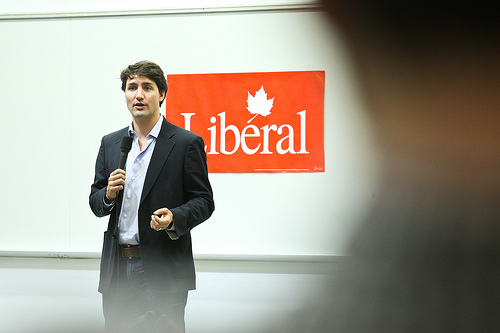Quickly now: What do the following have in common? No Googling necessary.
– London Health Sciences Centre ($20,000)
– Ontario Library Association ($10,000)
– The Learning Partnership ($10,000)
– Waterloo Catholic District School Board ($15,000)
– Ontario Public Service Employees Union ($20,000)
– Charity of Hope, Hamilton ($15,000)
– Algonquin and Lakeshore Catholic District School Board ($15,000)
– Kincardine District Secondary School ($10,000)
– Queen’s University ($12,000)
– Literacy for Life, Saskatoon ($20,000)
– Canadian Mental Health Association, Halton region ($20,000)
– Grace Foundation, St. John ($20,000)
First, they are all not-for-profit organizations.
Second, they never have as much money as they’d like.
Third, they are presumably meticulous with their expenditures.
Fourth, their budgets depend on governments, private charity or hard-pressed members.
Fifth, they all paid a huge fee — from $10,000 to $20,000, as shown in the brackets — to a sitting Member of Parliament to speak to them.
Sixth, that MP was Justin Trudeau.
I’m not sure what’s more outrageous: that these organizations shelled out very big bucks to have an MP address them — and if I were involved in any of them I’d want heads to roll — or that this MP didn’t have the good sense or ethical sensibility to decline.
On the contrary, since becoming a Member in 2008, Mr. Trudeau has raked in $277,000 in speaking fees from 17 speeches.
Let me try to be fair here. We wouldn’t know any of this if Mr. Trudeau hadn’t voluntarily disclosed to the Ottawa Citizen a great deal of personal financial information. This included not only his speaker’s fees but also his inheritance from his father, worth about $1.2 million in 2012. Kudos to him.
As well, his speaking gigs were, to my surprise, approved by the Parliamentary Ethics Commissioner, Mary Dawson. Still, it left the decision to his own judgment, which is precisely the issue here.
Mr. Trudeau seems to have been a remarkably successful professional speaker before being elected, in one year pulling in fully $462,000. Good for him. As a private citizen he was entitled to squeeze what he could from organizations that invited him to speak, though some of us on the speakers’ circuit have always been reluctant to take fees from community or charitable groups. Again, it’s a question of judgment.
That MPs must not charge a red cent to speak to charities and not-for-profits should go without saying, though obviously it does need saying. What about private companies? Since becoming an MP, Mr. Trudeau has also been paid handsomely to speak to several of them. Businesses are of course free to use their funds as they choose. Still, morality is surely on the side of NDP MP Pat Martin who insists that “It is absolutely untoward and inappropriate for MPs or senators to charge a speaker’s fee. I’m paid handsomely to be a Member of Parliament and if I’m invited to speak … that’s one of my duties to share that with civil society, free of charge, gratis.”
That handsome MP’s reward includes a $157,731 annual salary plus $25,850 in accommodation expenses plus 64 round-trip plane trips. At a time when fewer and fewer Canadians make a secure, livable wage or get any benefits and pension at all, this must seem like winning the lottery. But for MPs outside the cabinet, it’s just the beginning. Yet speaking to a school board, university or hospital means being paid a second time from the public purse, a clear case of double-dipping by any standard.
Yet Mr. Trudeau accepted such engagements from the time he was elected until the time he decided to run for party leader. It’s hard to understand how someone on an MP’s salary, who also happens to be worth more than a million dollars, can rationalize taking large speakers’ fees.
Mr. Trudeau does himself no favours when he claims that when he speaks at such events, he doesn’t talk politics. What else does a Member of Parliament do? He explained to the Ottawa Citizen that his topics include youth issues, education and the environment. Was this a joke?
It’s quite something to assert with a straight face that these are not political issues. If you happened to be your party’s parliamentary critic for youth, can you even open your mouth on “youth issues” without being political? And if you are that critic, are you conceivably allowed to charge school boards or promoters of learning when you address them? Isn’t that what the critic’s duties are all about? Isn’t that what an MP gets paid to do?
Coming on top of his decision to skip a crucial vote on AIDS drugs for Africa, these revelations make you wonder about Mr. Trudeau’s disabled moral compass. Does he know right from wrong?
Of course I wouldn’t for a moment want the tawdry revelations about our imploding Senate to cease. For example, the Duff — as Senator Mike Duffy adoringly calls himself — also offers himself as a speaker, his website declaring that he’s “much sought-after as a keynote speaker for charity.” No doubt. But his fee is not mentioned. We can confidently expect many more headline-making revelations to come from the Senate mausoleum.
But Justin Trudeau wants to be Prime Minister of Canada. He deserves the intense scrutiny that comes with such a heady ambition, and he already has much to answer for.
This article was first published in the Globe and Mail.
Photo: Adam Scotti/Justin Trudeau/Flickr



